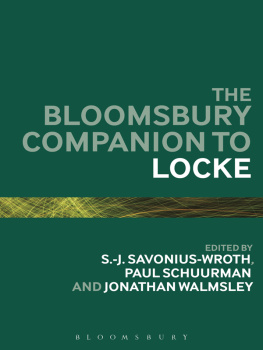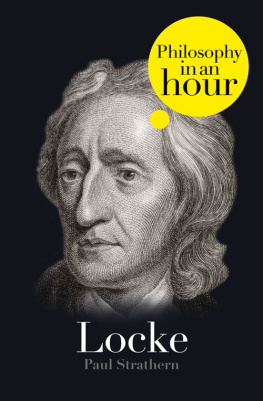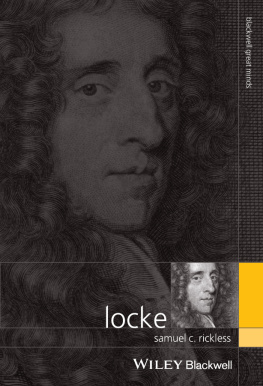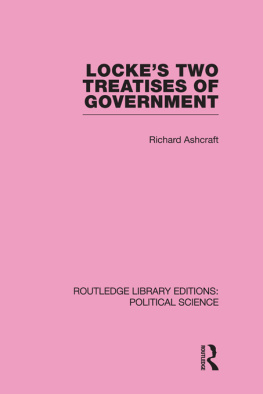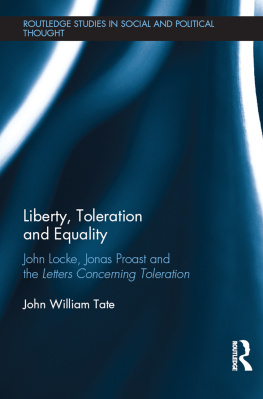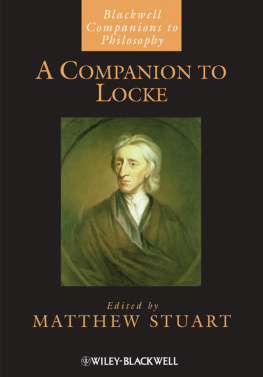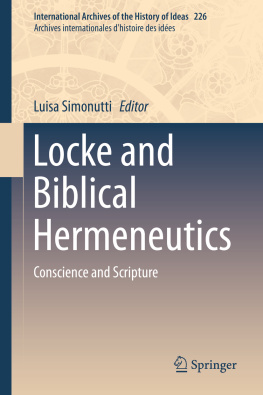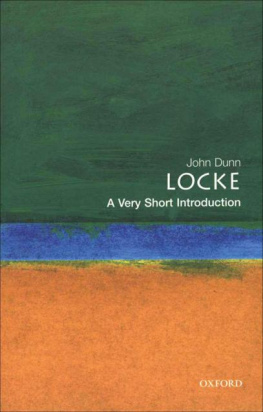The Bloomsbury
Companion
to Locke
Bloomsbury Companions
The Bloomsbury Companions series is a major series of single volume companions to key research fields in the humanities aimed at postgraduate students, scholars and libraries. Each companion offers a comprehensive reference resource giving an overview of key topics, research areas, new directions and a manageable guide to beginning or developing research in the field. A distinctive feature of the series is that each companion provides practical guidance on advanced study and research in the field, including research methods and subject-specific resources.
Titles currently available in the series: Aesthetics, edited by Anna Christina Ribeiro
Analytic Philosophy, edited by Barry Dainton and Howard Robinson Aristotle, edited by Claudia Baracchi
Continental Philosophy, edited by John Mullarkey and Beth Lord Epistemology, edited by Andrew Cullison Ethics, edited by Christian Miller
Existentialism, edited by Jack Reynolds, Felicity Joseph and Ashley Woodward
Hegel, edited by Allegra de Laurentiis and Jeffrey Edwards
Heidegger, edited by Francois Raffoul and Eric Sean Nelson
Hobbes, edited by S.A. Lloyd
Hume, edited by Alan Bailey and Dan OBrien
Kant, edited by Gary Banham, Dennis Schulting and Nigel Hems
Leibniz, edited by Brendan Look
Metaphysics, edited by Robert W. Barnard and Neil A. Manson
Philosophy of Language, edited by Manuel Garca-Carpintero and Max Kolbel
Philosophy of Mind, edited by James Garvey
Philosophy of Science, edited by Steven French and Juha Saatsi
Plato, edited by Gerald A. Press
Pragmatism, edited by Sami Pihlstrom
Socrates, edited by John Bussanich and Nicholas D. Smith
Spinoza, edited by Wiep van Bunge
THE BLOOMSBURY
COMPANION
TO LOCKE
GENERAL EDITORS
S.-J. Savonius-Wroth
Paul Schuurman
Jonathan Walmsley

CONTENTS
To go about explaining any of John Lockes works, after so great a train of expositors and commentators, might seem an attempt at vanity, censurable for its need-lessness, were there not three good reasons to justify it. First of these is the current health and vigour of Locke scholarship. For almost 250 years after Lockes death scholars generally had to content themselves with the study of his published works and the occasional volume of letters or manuscripts that might find its way into print. Lockes papers were preserved by the Earls of Lovelace, descendants of Lockes relatives, and the Lovelace Collection, as it was known, was secured for posterity by the Bodleian Library in 1947. From this point forward scholars found themselves with access to notebooks, drafts, letters and records from the entirety of Lockes career. They have busied themselves in cataloguing, researching and publishing interesting findings from the collection, showing it to be rich, deep and revealing. Important works, previously known only through oblique references, have come to light for example The Essays on the Law of Nature. Dates of key events in Lockes career have been definitively established, often with surprising consequences in particular, Peter Lasletts research concerning the Two Treatises of Government cast this work in an entirely new light. Even now, more than sixty years after the collection was acquired by the Bodleian, substantial texts remain unpublished for example, Lockes Critical Notes on Stillingfleets The Mischief of Separation (1680) and The Unreasonableness of Separation (1681). Lockes journals, which he kept for much of his adult life, are still only partly available in print. Important new discoveries are still being made for example, an accurate chronology of the extant drafts of the Essay concerning Human Understanding has only recently been established. Looking beyond the Lovelace Collection, significant stretches of Lockes career have yet to be fully researched Dutch records concerning his exile in Holland, for instance, have not yet been fully explored and exploited.
Capitalizing on all this scholarly activity, the Oxford University Press, aiming to produce the first comprehensive critical publication of the Lockean canon, has sponsored the Clarendon Edition of the Works of John Locke. This has already resulted in Nidditchs edition of the Essay, and De Beers Correspondence, not to mention editions of St. Paul, the Reasonableness, Some Thoughts Concerning Education, the Papers on Money and, most recently, Lockes early work on Toleration. Scholars still have much to look forward to a complete edition of the Drafts of the Essay, the Stillingfleet Correspondence, the Letters on Toleration, the Two Treatises, the journals, and several other volumes. So while much research has been completed, a great deal more remains to be undertaken. It is likely that there are more interesting scholarly discoveries yet to be made. There has, in short, never been a better time to be a Locke scholar.
If the health and vigour of Locke scholarship provides the first good reason for a fresh consideration of Lockes work, the changing tenor of this scholarship provides the second. We do not expect historians of science to be practising scientists, or historians of art, artists. The history of philosophy is something of an exception to this rule. Contemporary philosophers often act as custodians of their subjects past -taking the work of their predecessors as their starting point, and using it for their own ends. Thinkers such as Locke set the terms of modern philosophical debate. But contemporary philosophers sometimes forget that both the terms and the debate have evolved radically over the last 300 years. Philosophers today can all too easily overlook the historical context in which their predecessors worked and treat them as if they were engaged in current philosophical disputes. This can impose categories and concerns on their work, of which they had no conception.
In Lockes case, thanks to the recent wave of scholarly activity, such an ahistori-cal attitude is no longer tenable. Locke must now be read as very much a man of his times, whose considerations and conclusions were stimulated by the era in which he lived, and whose views cannot be properly understood outside it. Locke scholarship today is much more likely to be about the circumstances in which Locke made a certain remark, and what it might mean in that context, than about whether his views can immediately solve todays pressing philosophical problems. Indeed, the former is necessary for the latter to be possible.
A third good reason for re-examining Lockes work is the expanding scope of Locke studies. If contemporary philosophers have sometimes been remiss in the way they have studied Lockes work, they have also been somewhat partial in what they have studied. Locke has been viewed as the writer of the Essay, the Two Treatises and (sometimes) the Letters on Toleration. These texts have been taken to define his intellectual interests, and consideration of his life and work has been largely confined to these alone. Examining some current summaries of his thinking, readers might have no idea that Locke wrote a seminal work on education, helped draft the constitution for one of Englands North American colonies, produced two significant works of biblical scholarship, published papers on economic theory and wrote several reports on a variety of government affairs. They would not know that he trained to be a doctor, was a diplomat and a civil servant, worked with some of the keenest political minds of his generation and went into exile under suspicion of sedition. He was much more than what we would today consider a philosopher. Contemporary philosophers often lack the training in intellectual history that would help them appreciate the full spectrum of Lockes work and, as a consequence, the breadth and depth of his thinking has been neglected. The recent proliferation of Locke scholarship, and the broader consideration of the context of his work, has led to a much wider appreciation of his diverse intellectual interests, and the interconnections between them.
Next page
